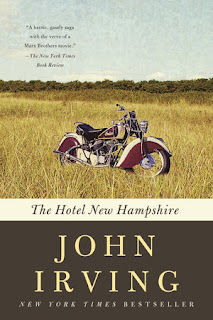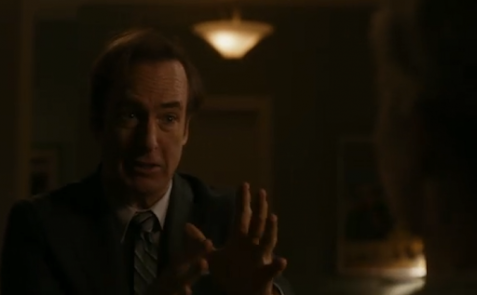Choose Your Own Advent, Day 24: The Hotel New Hampshire
Title: The Hotel New Hampshire
Author: John Irving
Year: 1981
I’m closing this series the way I opened it: with a book I read on a whim, and which affected me deeply. In both cases I had no expectations going in. In both cases, I just felt compelled to pick up the novel. In both cases, I came away a different person.
This is why I read. This is why everybody should read.
The difference between those experiences, though, is that Catch-22 turned me into a writer. I was younger then. I wasn’t…me. I was somebody, for sure, but Catch-22 hit me at the right time. It gave me direction I didn’t know I needed. It said, “Look. Look at all of the amazing things literature can do.”
And I never looked back. I’ve been reading and writing ever since. The number of days on which I’ve done neither is very low indeed.
That’s a great trick, but as Daffy Duck so eloquently put it, you can only do it once.
Because I’ve been a reader and writer ever since, books can’t affect me that way anymore. One of them had to do it, and one did. Now, sure, I may read a book that I end up loving, but it can’t be transformational. Can it? How many times can a human being be reinvented?
The Hotel New Hampshire didn’t reinvent me, but it could have. Maybe if I had found it earlier. Certainly reading it for the first time was like hearing echos from a past I never lived through. It felt familiar. It felt like an unburied memory. It felt like I was revisiting a book I loved long ago and finding that it was every bit as important as I thought it was then.
With one difference, of course: I’d never read it before.
It was too late to change me. But that doesn’t mean it couldn’t improve me.
I worry, probably too often, that there are a finite number of books I’ll be able to read before I die. I worry because…well, I love books. I want to surround myself with them. I want to get lost in them. They mean something to me in a way that so much else…doesn’t. They’re important. They’re enriching. I keep reading, experiencing, falling in love dozens of times over…
And one day I will die.
And when I do, literal mountains of books will be left unread.
That’s sad enough.
It’s worse to realize that some of those books could have become favorites as well…and I’d just never gotten around to them. Life was too short. Some alternate version of who I could have been is locked away forever in a book on some shelf that I never had time to pick up.
I think you can guess which episode of The Twilight Zone hits me hardest.
That’s the whole reason I’ve done these writeups at all. Somewhere out there, there’s a book that can affect you. A book that can change you. A book that can teach you things about yourself and about the world and about people you never meet, and that’s a more valuable gift than most of us realize.
Read. Grab a book and read. Ask for recommendations, or don’t. Follow your gut, follow the reviews, follow something that leads you to a book, because literature is important. Literacy is important. Opening your mind to the numberless volumes of great works that have already been written is important.
The Hotel New Hampshire called to me from a shelf just a few short years ago, the same way Catch-22 did a lifetime ago. I didn’t recognize its voice, but it still sounded familiar. And I ended up loving a book so immediately, so deeply, so urgently, in ways I hadn’t felt since Catch-22. Old feelings came back. Something was rekindled. Something that I thought I was privileged to feel once I was downright blessed to feel twice.
The Hotel New Hampshire is the story of the Berry family, and the relentless unfolding of their continuous tragedy. Except…get this…it’s actually pretty comforting. And inspiring. And funny.
Their lives seem to be cursed. No sooner does one misfortune pass than another–usually larger and more devastating–takes its place. We follow the Berrys over the course of many years…watching them grow up, grow older, push along through sorrow after sorrow…
…but not mournfully. Because they have each other.
And that’s something I’ve never actually witnessed in a great work of literature before.
I’ve seen happy families. I’ve seen sad families. I’ve seen families pull together and families fall apart.
But I’ve never seen a family stay so consistently loyal, so open and dedicated to each other, through so much unimaginable darkness…and I never thought it could be so convincing.
A lot happens in The Hotel New Hampshire, and different scenes and sequences will stay with different readers to different degrees. But I think it’s impossible to come away from the book without a deep admiration for just how real the Berry family is. John Irving tapped into what makes a modern American family so sad, so stifled, so stuck…and reminded us that we can all find hope in our own way. Together, and yet as individuals. Doomed to face a darker tomorrow, and yet able if not to stare it down than at least to keep going. Or, as Irving himself puts it in this context, to keep passing the open windows.
The Berrys don’t ignore tragedy; they process it. They reshape it into something they can cope with. After all…don’t they sort of have to? Even when the tragedy is so large that it takes one of them (or two…) they understand that they need to keep going. What else is there?
And so The Hotel New Hampshire becomes, gradually, a chronicle of sadness that never quite feels sad. Because the sun does rise again. Maybe on a new and different tragedy, but there’s also a kind of richness to that. So much so that our narrator, John Berry, ends the book, yes, with a lot of sadness in his past, but with a personal history of exploration and understanding that he could not have had otherwise.
The Berrys keeps finding ways to move forward. And as upsetting as some of their experiences can be (there is one sequence that takes place during Halloween that I find tremendously difficult to read, though I deeply respect how affecting it is), they don’t get to choose what does and does not befall them. All they can choose is what they do next.
And, in that sense, the Berrys are heroes. They keep going not because they ever succeed…but because they don’t. In other hands, the Berrys would have starred in a cautionary tale. In other hands, so would all of us. But here, in The Hotel New Hampshire, they remind us that we’re all flawed, that we’re all groping along our own seemingly unending chain of miseries…
…and that that’s okay.
We can still choose what we do next.
The Hotel New Hampshire didn’t get to change who I was, the way Catch-22 did.
It just taught me something important about sadness, and how to process it.
It taught me that, no, you can’t reach into your life and pull out all of the things you wish you never experienced.
But you can keep going.
And you should.
Because there’s still something ahead that you’ll be glad you’ve seen. Even if it is, right now, just some book on a shelf.
Merry Christmas, everyone.



Comments
Post a Comment